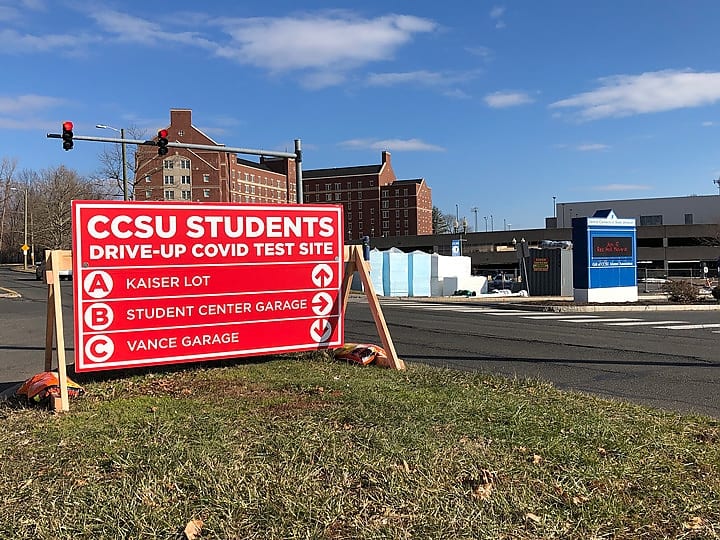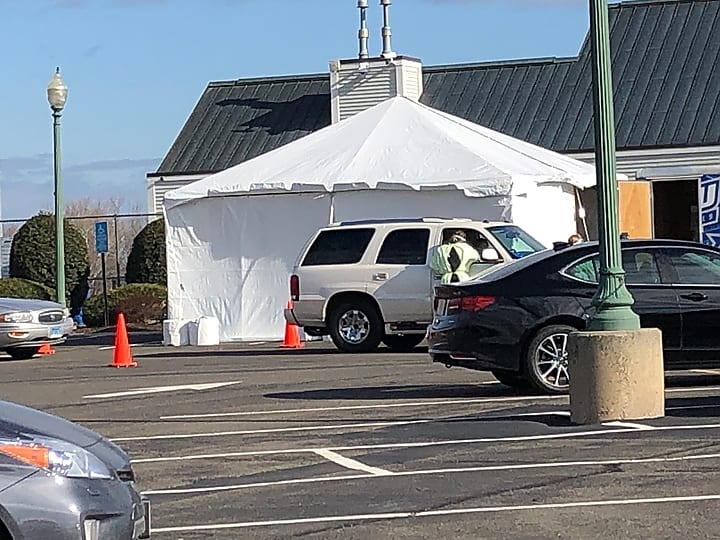Colleges Start Spring Semester with Souped Up Testing

Audio By Carbonatix

Signs around campus tell CCSU students where to go for COVID testing. Courtesy of CTNewsJunkie.com
At the University of Saint Joseph and University of Hartford in West Hartford, students are required to complete a seven-day quarantine before returning to in-person classes.

Drive-up COVID testing outside Arute Stadium at CCSU. Courtesy of CTNewsJunkie.com
By Emily DiSalvo, CTNewsJunkie.com
Although COVID-19 is more prevalent in Connecticut than in the fall, colleges and universities are forging ahead with reopening plans for the spring semester – albeit with significantly more testing planned.
“In the first seven days they will be tested three times with results and during that seven days it will be a quarantine,” said Sal Cintorino, chief operations officer at Central Connecticut State University. “It will be very structured and isolated to give us a quality environment.”
In the fall, CCSU students needed to show a negative test result within 14 days of move-in before arriving on campus.
“We have learned from that,” Cintorino said. “You can test today and four days from now you can be positive.”
Every single CCSU student, faculty and staff member will be tested every week as opposed to 25% of the population that was tested last semester.
The increased frequency and prioritization of testing is a pattern at other schools in the state.
At the University of Connecticut, the number of tests administered is projected to increase from 42,000 during the fall semester to 75,000 this spring, according to UConn Today. The university will employ multiple testing strategies including “pool testing” which will help them identify clusters of cases in residence halls.
“They spit into a small vial we’ve provided and we pool the saliva into one larger sample for testing,” said Michael Enright, UConn deputy spokesperson. “If a pooled test comes back positive, we then go back and conduct individual tests on those who were part of the pool.”
UConn will also be testing the wastewater from toilets flushed around campus for the presence of COVID-19 particles in feces.
“We’re adding some testing spots around academic buildings, in addition to residence halls, to get a sense of where the virus might be showing up,” Enright said.
Commuter students at UConn’s various campuses – including graduate students – who will be attending any class in person at any point during the semester, are also being sent saliva testing kits, which come with instructions that include completing the test while being supervised via Zoom. Testing must be completed in advance of attending the first class.
Eastern Connecticut State University is employing a strategy similar to what took place last semester for arrival testing. Students have to show up with a negative COVID-19 test taken within 14 days of arrival on campus, said Edward Osborn, director of marketing services at ECSU, and then after that, 100% of students will be tested every week.
“The difference will be we will then test all of our residential students over a two-day period,” Osborn said. “They will then have a limited or soft quarantine for the first week. They will be able to go to class.”
At CCSU, students moved in a week before classes started to allow for a full seven days of quarantine.
“We didn’t want to start the semester with everyone remote.” Cintorino said. “There is so much virtual fatigue as it is. This first week with them coming early we will create the quarantine and seven days later we will start the (weekly) testing protocol.”
Both ECSU and CCSU said all students will be tested every week until at least March, at which time health officials will reevaluate the persistence of COVID-19 in the area and the possibility of increased vaccinations.
“Even though the vaccine is around the corner, this is no time to let our guard down,” Osborn said.
Earlier this month the Department of Public Health issued guidance to colleges in anticipation of the spring semester.
Other University Testing Plans Across The State
Undergraduate residential students will return to campus on Jan. 24 and will be required to spend the first seven days in quarantine. Residential students will participate in classes remotely until Feb. 1 at which time they may resume normal activities on campus assuming they have completed seven days in quarantine and their COVID tests are negative. Commuter students will not be able to attend classes in person or visit campus until Feb. 8, and are advised to receive a COVID-19 test prior to returning.
Residential students will be returning to campus between Jan. 27 and 30, and will be required to quarantine on campus until Feb. 7. The first week of classes will be held in remote format. All students are required to submit documentation of a negative PCR COVID-19 test taken within seven days prior to moving in, or, for commuters, prior to attending the first in-person class. Residential students will receive a rapid test when they arrive on campus. Undergraduate students will be tested weekly for at least the first month.
Students must arrive on campus with a negative COVID-19 test. The tests were mailed to students earlier this year and students are assigned a date to take the test and mail it in. Upon arrival to campus, students will be tested again. All students will be tested every week through Feb. 28.
Students must provide a negative PCR test taken within five business days of arrival. Those who tested positive for COVID-19 within 90 days of arriving to school are exempt from testing. Random testing of residential students will take place throughout the semester with the help of a partnership with Yale called “SalivaDirect.”
All students are tested on the day they arrive on campus. Going forward, students will be tested twice weekly. Administration will reduce frequency of testing if transmission is low.
Prior to arrival Connecticut College students are asked to isolate from Jan. 21 through Feb. 4 or 5. Then they take a pre-arrival test and mail it in. Students with last names L-Z arrive on campus on Feb. 4, and complete their first on-campus test. Students with last names A-K arrive on campus on Feb. 5, and complete their first on-campus test. Classes start entirely online on Feb. 8, and students quarantine that week while being tested again.
Students will return to campus in two staggered waves after a negative COVID-19 test. Tests must be taken and mailed in five days before the planned move-in date. All students will be tested in a predesignated schedule before returning to in-person learning when they arrive on campus. Regular testing will continue as conducted last semester.
Southern Connecticut State University
Residential students must have a negative COVID-19 test before moving into campus. A “small percentage” of students will be randomly tested each week.
Western Connecticut State University
Classes will be held in a virtual format, according to the university website.
Students will be required to take a pre-arrival test. After moving in, all students will be assigned to a twice-weekly testing schedule for the duration of the semester.
Ronni Newton, We-Ha.com, contributed to this story.
Republished with permission from CTNewsJunkie.com, all rights reserved.
Like what you see here? Click here to subscribe to We-Ha’s newsletter so you’ll always be in the know about what’s happening in West Hartford! Click the blue button below to become a supporter of We-Ha.com and our efforts to continue producing quality journalism.



